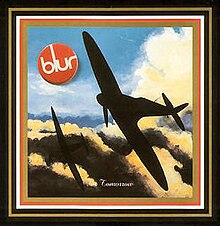For Tomorrow
| "For Tomorrow" | ||||||||
|---|---|---|---|---|---|---|---|---|
 |
||||||||
| Single by Blur | ||||||||
| from the album Modern Life Is Rubbish | ||||||||
| B-side | "Into Another", "Hanging Over" (12") "Peach", "Bone Bag" (CD1) "When the Cows Come Home", "Beachcoma", "For Tomorrow (acoustic)" (CD2) |
|||||||
| Released | 19 April 1993 | |||||||
| Format | 12" vinyl, cassette, 2 x CD | |||||||
| Recorded | January 1993 | |||||||
| Genre | Britpop | |||||||
| Length | 4:18 (Album and single version) 6:00 (Visit to Primrose Hill extended version) |
|||||||
| Label | Food | |||||||
| Writer(s) | Damon Albarn, Graham Coxon, Alex James, Dave Rowntree | |||||||
| Producer(s) | Stephen Street | |||||||
| Blur singles chronology | ||||||||
|
||||||||
|
||||||||
"For Tomorrow" is a song by English alternative rock band Blur. It is the lead track to their second album, Modern Life Is Rubbish (the title appears in the lyric). Released 19 April 1993 as the first single from the album, "For Tomorrow" charted at number 28 in the UK Singles Chart. The Visit to Primrose Hill Extended version of "For Tomorrow" was included in the band's compilation albums, Blur: The Best of, (being the only song from Modern Life Is Rubbish to be featured) and Midlife: A Beginner's Guide to Blur.
In this period the band had gone on a tour of the US which they greatly detested, especially as the country was the home of grunge and audiences were not receptive to their music. After that tour lead singer Damon Albarn started to write songs with a very British feel. This was one such song, written on Christmas Day 1992 at the family piano in his parents' house. David Balfe, the head of the band's record company, commissioned this song as the original album did not have any hit singles.
Like the rest of Modern Life Is Rubbish, the song was produced by Stephen Street, although Jeff Lynne was also considered as a possible producer. The chorus features a la la la refrain, sung by female backing singers, whom Street instructed to sing like Thunderthighs on the classic Mott the Hoople singles. Guitarist Graham Coxon explained that "Everyone, wherever they are in the world knows what la la la means." A string section, The Duke String Quartet, was also used by the band for the first time. The single cover of the two World War II fighter planes was used by the band as a sense of Britishness.
...
Wikipedia
